
I crossed from Zambia to Botswana on ferry which took about 10 minutes. Three countries meet at this point: Zambia, Zimbabwe and Botswana. The ferry service is provided free of charge. There is an incredible long vehicle line since the ferry is able to transfer only one truck at a time. There had been two ferries but one is out of service. With only one ferry this trial seems never ending. Crossing to the other side I went to customs area and was given one month of visa. At the capital Gaborone it is possible to extent the visa for two more months.
After completing all the procedures I was asked to pass the wheels and my shoes through a pit filled with disinfectant. Entering Botswana from the north all the vehicles are required to drive through disinfectant filled pits and the people to clean their shoes on disinfectant solutions. I also was asked to take my shoes out from my bag and rub them on the disinfectant dip. This is a precaution against harmful viruses since the animals in this land are allowed to move freely. A good application. I entered the country with 100 Pulas in my pocket. I need to find an ATM. The nearest city is Kasane 10 km ahead. Then the next village is 150 km far and the next town 175 km which means that the settlements are apart from each other in Botswana, a quite dangerous situation for a tour biker.
Why is cycling dangerous in Botswana?
Safari in Botswana is not an event as in the other African states, especially in the northern region of the country. This country is of the same size of France but with a population of only 2.6 million people. The number of elephants on the other hand is above 100 000. The number of animals in wild life reserves is more than the population of the country and therefore the whole country itself is a national park. As I mentioned you above especially in the northern part of the country the animals are free to move. There aren’t any fences, barriers or lines. Anyway how can one stop such a high population of elephants with fences or guardrails? They’ll just bulldoze through. Especially Kasane had been suffering from such attacks.
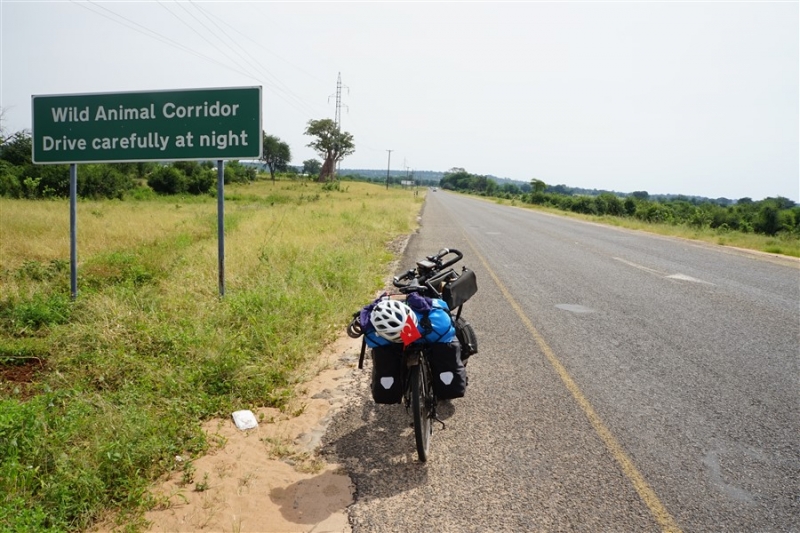
Men! In the middle of the town you see the warning sign “Attention! Elephants may cross”. The city has been built on the path which the elephants had been using to reach the river. People were complaining to the government that the elephants were harming tourism, entering the hotels etc. You construct a building on the path approaching the river and then you blame the animal! The animals are doing right! Just keep on moving dudes bulldoze through!

Since the elephants are dominating the region, naturally it is impossible to fence the other animals: Buffalo, cheetah, leopard, lion, hyena, zebra, impala, kudu, in short any animal which may come in your mind. For years I have been asked “Aren’t you afraid of dogs? What do you do when you come upon a dog?” There are cyclists who have traveled through this country but there are only a few who crossed the country on bikes without any escorting vehicles sharing their travel on internet. Especially I want to warn the ones who want to travel on bike in this country once again. If you are lucky you won’t come across any carnivores and stay saved from being hunted. Many of the deaths of local people are caused due to animal attacks.

Well, how to ride bicycle in such a region? You do as such: First of all I don’t set off in the early hours of the morning. Wild animals start hunting for food after it gets dark and continue till 9-10 a.m. If they were unable to find food hunting may last till 12 a.m. During noon time, not even the wildest animal will be in sight. Due to the sun they won’t stroll around in open areas and rest under shadow. At 18:30 that is when it gets dark the place where I stop must be definitely a settlement, because I have to put my tent up behind the protective fences of the settlement. All the village houses in the region are surrounded either by fences or walls. The walls are more defensive, the elephants just walk around. The number of farmers of which fences were demolished or fields were destroyed by elephants or lions is not low. The government compensates the losses of people in such cases. Since this country has a low population I don’t see any cars or people while riding on the roads for hours apart the main road. For at least 70 km I’m on my own for sure. That is I have to arrive in a settlement between 10 a.m. and 6:30 p.m. no matter what happens. Otherwise, the lions would come to lick the water droplets on my tent the next morning.
Don’t think that you won’t come across any wild animals basing on what I have mentioned above. Actually, this is a matter of pure chance. If you hear someone mentioning that she/he did not come across an elephant along the road, the possibility she/he would to be chased by a polar bear in the desert might be high. It is impossible not to see an elephant while riding on the common roads in the north of the country. There were regions where I had passed elephants riding on bike. But in these regions also the local people were using bicycle as transport vehicle. The elephants were used to come across bicycles.
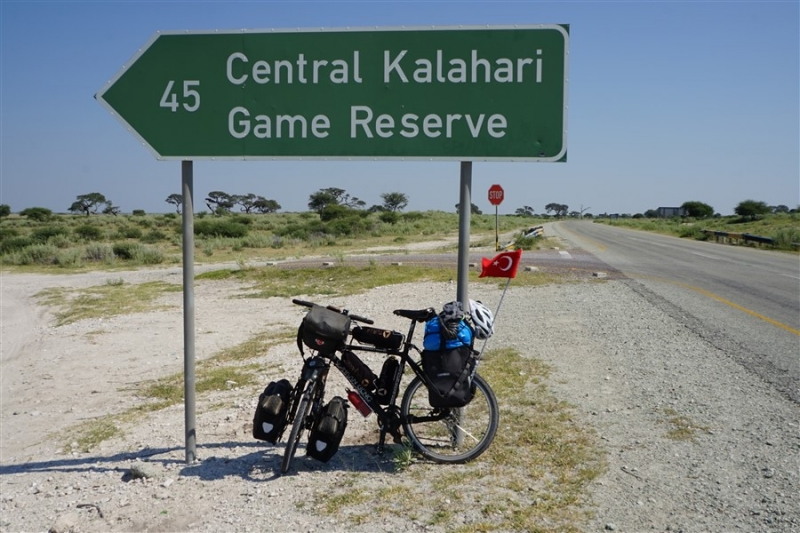
It is impossible to use bicycle as transport vehicle in Botswana since the daily life is interwoven with the wild life. I found out this in practice. Therefore it is not normal to ride on bicycle in the most parts of Botswana and solo riding not at all. It’s no joke. Well, “so why did you this?” people asked me. I have told you it is not normal, haven’t I? Recap the topic yourself.
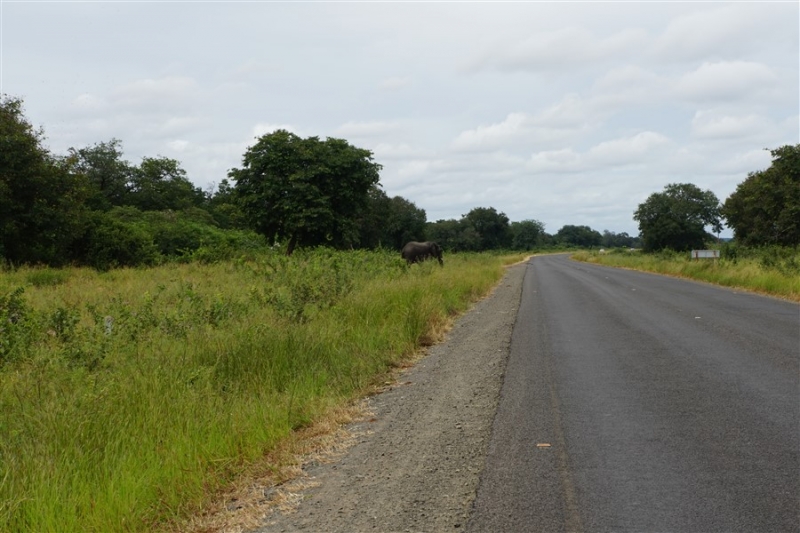
I left Kasane heading towards Nata. After 10 km I saw the first elephant in my life on the left side of the road, a huge and majestic animal. I took my camera out and started to record. About 30 m was remaining between us when he started to scream towards me suddenly turning back, I immediately stopped. Still I’m wondering how the elephant could move so fast. Then, as he also stretched out his ears and moved forward one step I said: “Fuck, he is going to attack me” and stood rooted to the spot. I knew that if I had turned my back to the animal, it would attack me. Meanwhile I put the camera down. The elephants are animals which can reach a speed of 40 km/h. I had never calculated before how long it would take me to reach 40 km/h from zero speed. But as I saw how fast the animal could make a turn with his giant body, I’m sure it would in no time catch and squeeze me down.
Calmly I pushed backwards without getting off my bicycle. The animal recognizing the increasing distance between us calmed down. Gosh! I dodged a bullet. Keeping a 100 m distance between us I started to wait for a vehicle to pass. Hah! There is the vehicle:
– Hey, hey! Could you help me? I want to ride next to your car to pass this elephant by.
– Of course. But it is insaneness to ride on bike in this area. There are buffalos and lions besides elephants and there are lots of elephants.
– Yes, I know.
The car driver kept the same speed as of mine and riding at the left side of the car I passed the elephant. Then, the car went away. After about 200 m I stopped when I saw 20 or more elephants on the middle of the road about 1 km ahead. The car stopped at a distance to the elephants. I started to watch the elephants with respect. Dare to horn to this group: “Get away!” Hahaha. They will defeat you completely.
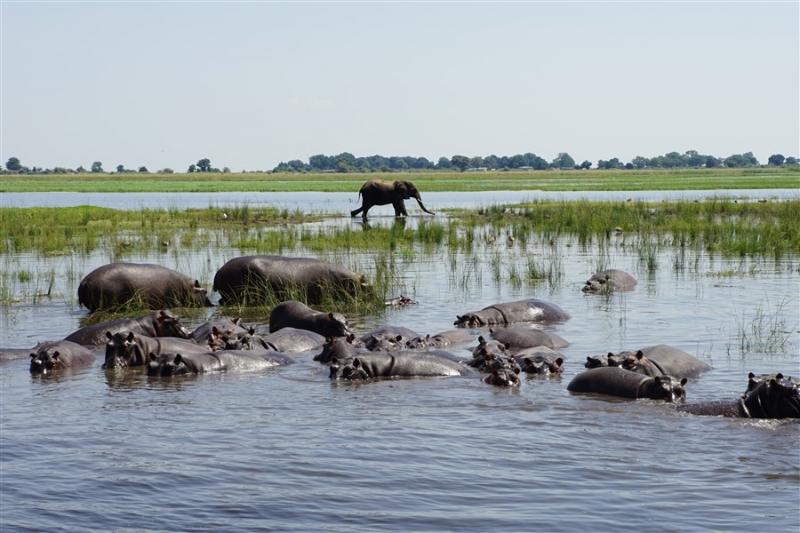
There are two types of charges of wild animals living in Africa: “Full charge” and “mock charge”.
Mock charging animal is pretending to charge but is actually testing you out whether you are a threat or not. The charge of that elephant was mock charge. The animals, elephants, rhinoceros, leopards, lions, hyenas, hippos are mock charging when they feel threatened. In the mean time, they think whether to really charge or not. If the danger is great or life threatening their charge turns into full charge.
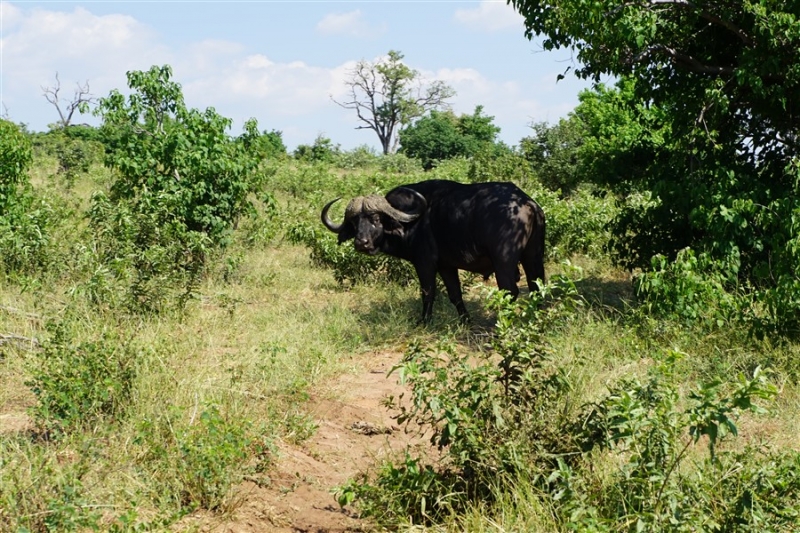

As far as I learned from the bushman or properly said from “San” people in this geography there are two animals which directly full charge without mock charging: Buffalo and warthog (African wild pig). The local people are not so afraid of the other animals but these two. “When you come across a lion don’t turn your back and run away. Even, try to step forwards and don’t be afraid.” There I also learned that Maasai people living in Kenya and Tanzania used to hunt lions. “Gurkan if you recognize a buffalo staring at you and rushing to you, run away immediately and climb on a tree closest to you.” One day after this talk one of the hunters came back late to the camping area and everybody asked him where he had been. He had been stuck on a tree for 30 min 2 km ahead due to charging warthogs. I came so close to this animal in some regions on bike, some were hiding among the bushes. They run away with their cubs due to the noises caused by my bike. Good that they did not turn back and charged the bike.
While watching the elephants from a far distance I took out one of the chocolates from my handle bar bag. As I was about to take a bite of the chocolate while enjoying the landscape all of a sudden an elephant came out of the bushes on right of my bicycle trumpeting. No good, not at all. I turned the handlebar very slowly and turned back. Actually I had to scream by fear but couldn’t, a situation of being between the devil and the deep blue sea. Behind me the elephant I had just passed by is at the right side of the road and stops grazing recognizing me moving towards him. Is it possible to laugh at such a situation? I was captured between two elephants and started to laugh. I’m at an equal distance to both of them at about 75 m. I remain motionless. I have 2-3 photos of such moments. Since my action camera is broken down I’m not able to record. I have only a few shots while passing the elephant along the escorting car. I have to hold the handlebar with two hands. What hell I’m going to do?
The one behind me came to road side and started to graze. Also the elephant in front of me started to graze watching me remaining motionless.

The ones following my Facebook page know that I had come very close to wild elephants in Tanzania and Zambia living freely in the nature. Let me repeat once again. It is impossible to pass the elephants by in Botswana. These animals are very aggressive. I think even walking by is almost impossible. A villager once I came upon said: “Be behind the fences before it gets dark or you’ll be charged by the elephants.” Some people were charged by elephants walking in the night.
While waiting a car came from the direction I was heading to. His eyes popped out recognizing me between the two elephants… He stopped next to me:
– Your friend got in a vehicle 50 km ahead. There are too many elephant herds on the road.
– I have no friend, I’m on my own. Is there another man like me ahead?
– Yes, there is another cyclist like you. He couldn’t move forwards due to the elephants. He put his bicycle on a vehicle.
– Could you come between us till I pass the elephant by?
– Alright. But further ahead there will be more elephants. Furthermore, there are l ions moving as a herd in this region.
– Alright. Thank you for the information.
After passing the elephant by I stopped at a place which I thought reasonably to be safe and looked on GPS where the next settlement is, 90 km ahead. It is doable before it gets dark if not stopped by elephants. But the situation being not so, it would be impossible to reach that settlement and I would become an open target for the hunting animals. Since there aren’t any other alternative routes I have to cross the three national and two safari parks in front of me in a vehicle and then continue on bike. I put my bicycle on the back of a trailer truck going to South Africa and traveled this way for 250 km.
Well, coming to the cyclist in front of me. I don’t know who he is. I haven’t come across any cyclist traveling in this region. I don’t know where he went. During the 2000 km I rode in Botswana on bike I haven’t come across any other cyclist.

I must say that I cycled throughout Botwasna and one month was enough for that.
I stayed 3 days in Kasane, 3 days in Francistown, 3 days in Orapa, 3 days in Maun, 2 days in Dekar and 2 days in Xhumaga and rode 2000 km on bike for the rest 14 days. Especially, there were areas I made 160 km per day during the last week. One day before my visa expired I applied for a new one in the capital town and received visa for one month.
Among the sub-Saharan countries Botswana seemed a completely different country to me. Not any one called me “Hey! Mzungu (white man).” Everyone I met invited me to their home. Nobody said you cannot camp here. They shared their meals. Nobody asked for money in rural areas. Many people asked for selfies. These were responses which I was not familiar for months. Even in the smallest groceries the prices of the products were scanned via computers. Therefore you don’t need think whether you pay more than the value of the product, I didn’t notice the prices of the products on my note book after a long time.
I may only be overcharged for accommodation in this country. For example I paid 20 USD for overnight staying in a hotel in Kasane town situated on the north of the country. Chobe National Park is situated in this town. I attended safari programs both on rivers and on open terrain for which I paid 40 USD. On the total for 3 days of accommodation, safari programs and meals I paid at most 150 USD. I had already mentioned in my previous article that safari tours were organized to this territory also from Zambia. These tours cost 150 USD per day. What I paid for safari in Africa was a fair price. Even, the lowest price I have heard so far. After Kasane I went to the town Nata for bird watching. Actually this is not a town but bigger than a village. The terrain is just awesome for bird watching. I checked the list of birds migrating to this place, a vast variety of birds. But since the month April does not fit into migration period it is hard to see any birds. Despite of this the hotel prices were 50 USD. I said: “I paid only 20 USD in a place like Kasane, it would be stupidity to pay 50 USD here.” There were only 3 hotels in the town all of which the same price. I found place where I was allowed to put up my tent for 3 USD on the back yard. That’s it. Why to pay 50 USD? Are you screwed up? I wouldn’t pay also the 3 USD but to camp outside the fences needs balls. : )
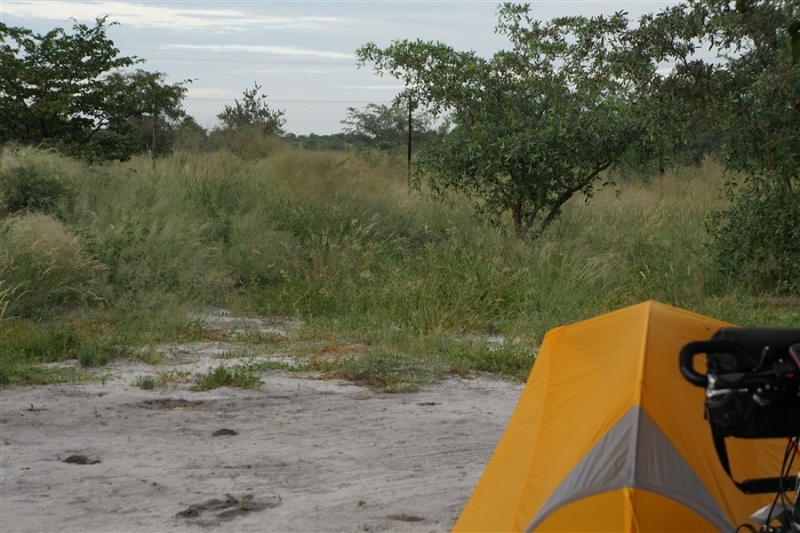
The road between Kasane and Nata has only partly shoulder. The road between Nata and Francistown was the hardest I have ever ridden on in Africa. The road didn’t have shoulder at all with heavy trailer truck traffic, the path outside the road was full of thorns and there wasn’t any alternative road. This road made me really suffer for 3 days.
Before arriving in Francistown one of the big cities, I came to a village road and started to grin. The village road was paved with first class asphalt. In the village the road was made of concrete. As time passed I saw that all the side and village roads were of good quality. The main international roads of the country were in worse conditions compared to the village roads.
There are police control posts at certain intervals. At these stations photographing is restricted even fined. The police officers got angry to a tourist taking my photo at one of the control posts, “why are you photographing here?” At one of these control post the police officer made me stop and asked where I was coming from and going to. Then:
– Is there anything you want to give me?
– What type of?
– What do you have in your bags?
– My belongings and camping gear.
– Nothing to give me?
– What do you have to give me?
– Am I to give you something?
– Well, I’m guest in your country. You have to pay my lunch or accommodation. If people like me don’t come to Botswana how would the country earn from tourism, how would the government pay your salary?
– Alright, you can go…
– Don’t you have anything to give me I’m hungry.
– …
You as a police are the face of your country. Stupid man why do you want money from me? This bribe issue is common in Africa but I haven’t given even once till now. I won’t give but take.

That day I rode 100 km till afternoon and stopped at a village, Mosetse with 8 at most 10 houses and a small grocery. After a small talk with the owner I asked her if she would allow me to camp behind the fences. “Before you a motorcyclist also camped here two weeks ago. Of course you can stay.” Till evening I talked with the owner and villagers. As they found out that I was still single, they joked with me arranging a so-called marriage with one of the single women around. I read a book for a short while. In short I had a nice time.
Before it got dark I put up my tent at the back of the building. In case of rain I put my tent in the middle of the place.
After I had my dinner I went inside my tent to read my book and at the same time it started to rain. It was a heavy rain. I was caught in rain for the first time in this new tent (you can find on my equipment page what type of a tent I’m using.)
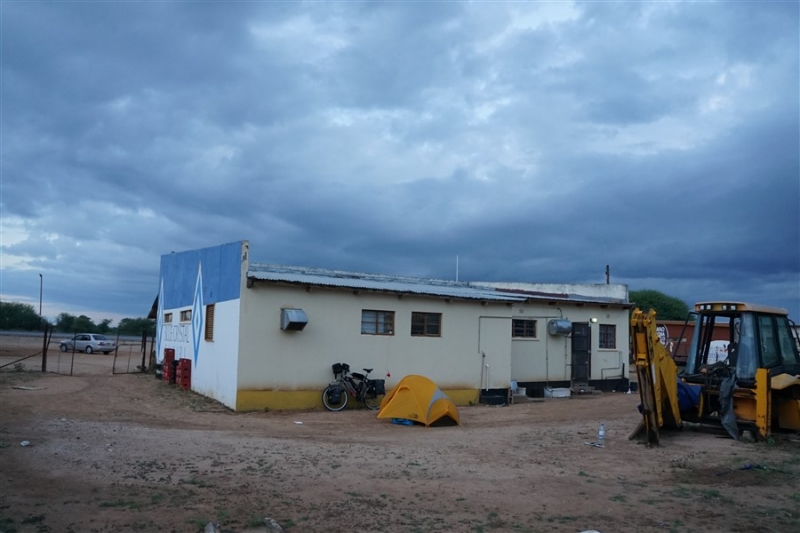
There weren’t any problems and after a while I felt asleep. The sound of the rain drops was like a lullaby. Once I wanted to turn from right to left and I felt my body was waving. I woke up it was still raining. Gee…
Below the tent at least 7 cm of a water layer was accumulated. I looked outside the water was actually not accumulating below me but flowing like a river. I checked my bags on the side they were held by the outer layer of the tent prevented by flooding away. My shoes outside were in a nylon bag. For the time being no problem but if the water layer increases 3-4 cm more it will flow in to the tent through the zippers. Meanwhile I put my sleeping bag into one of the waterproof bags, just in case. I had experienced a similar situation in Germany. Tent life has been a part of my life for the last 6 years, easier said than done. I said: “what I’ve gone through so far.” At that moment a water head 20 cm high hit the tent. Muddy water was drained from my head to foot. It took only a few seconds for me to open the zip and rush out of the tent and the tent crashed down. The only thing I could rescue was the handlebar bag. All the rest was flooded and then held by fences. My bicycle was buried in mud, the poles of the tent broke down and I heard the noise of ripped tent fabric. The handlebar bag in my hand I thought on what happened in seconds under the pouring rain. I stayed still for a few second to understand what happened and how I came through and how I could handle so fast..
The guy in front of the door of the house at the back called me. While walking towards him in water till my knees I saw logs and other big objects held by fences. If they had not been held by the fences they would hit my tent. As I came to him:
– I was watching your tent for hours, you didn’t come out.
– If the water head wouldn’t hit the tent, I still wouldn’t come out.
– Part of your bicycle is visible.
– Yes, I have to take it…
This house was also under danger. I put down the objects I was still holding in my hands. My head light also flooded with the tent. In such moments I realize the importance of equipment diversity. I took out my Sony Compact Z5 phone which I had used for underwater records at Victoria Waterfall, turned on its light and rushed back in to the water. Everywhere were insects and lizards. Dude, what’s this? A snake, fine… I was walking to my gear bare footed. By the way the entrance of the toilet 15 m ahead was also under water. That is the hole which I did my toilet yesterday is filled with rain water and the feces of people were now swimming under my feet.
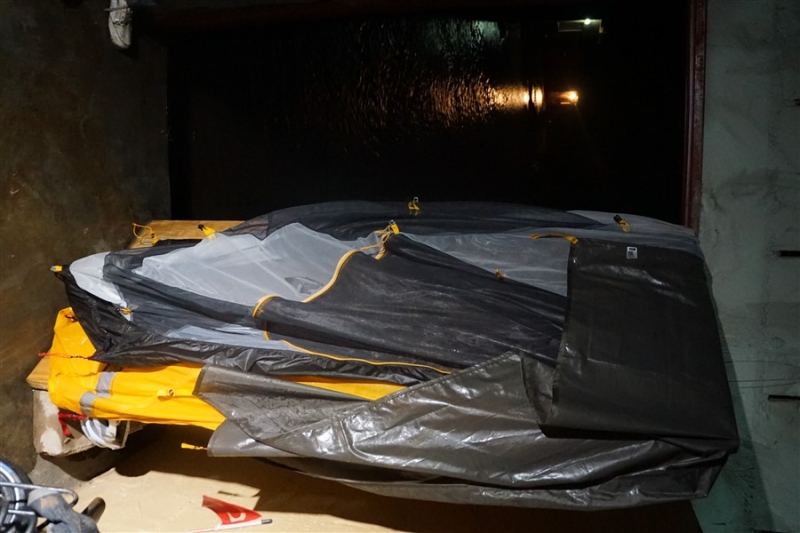
First I take out my bike from the mud. The only damage on my bike would be on the dynamo since it was sunk completely. The depth of water I can enter with my bicycle is the height of the dynamo. It shouldn’t be completely submerged in water. Anyway, I’ll check it tomorrow. Afterwards I turned back and lifted the tent held by the fences to drain. Well, it looks like the pole was broken. I put them in the house and turned back. I started to pick the bags from the mud. The equipments for night shooting were in one of the first two bags. I took the tripod, the projector and the camera out from the bag. My host was looking at me astonished. That was not kind of a thing to do at that moment. I recorded a video about what had happened. Then, I got the rest of the bags. Missing were the thermos bottle on the bicycle, the tube for stove gas and 2 L water bottles. The house by the way was actually a small watch box. There was no place to sit or to sleep. The surroundings were filled with any type of reptiles which here running for their life. I put a spider to a drier place. Then, I cleaned the surface of the air mattress which was completely soaked with mud. I opened the bag to change my wet cloths. Ups, water entered this bag through the rounded end. The bag was completely filled therefore I could only make a one turn of folding. Look, for example, if I still would be using my previous bags they would get wet from the upper part. Why? It is because they weren’t produced for such circumstances. They were all left for at least 30 minutes under water. Anyway, I found some dry cloths and changed. I wore my raincoat and lay down on the mattress. Nothing to do, I’ll wait till morning to see the extent of the harm. Meanwhile, the rain relented. : )

After I woke up in the morning I looked at the place I had put my tent up. Water was still running down through this place. Men! You could think that it was a river bed where I had put my tent. Actually, it didn’t seem as such a place. Anyway, this was a great experience and what counts I’m still alive. I took my tent outside and left to dry. The broken pole caused a hole on the outer tent. The broken part is missing. Without this broken pole I won’t be able to put my tent up. I immediately called Zambia for not sending back my other tent to Ankara. I would leave my bicycle here, cross the border and hitchhike to Lusaka 850 km away from here, get that tent and return, then continue on my voyage, that’s all…
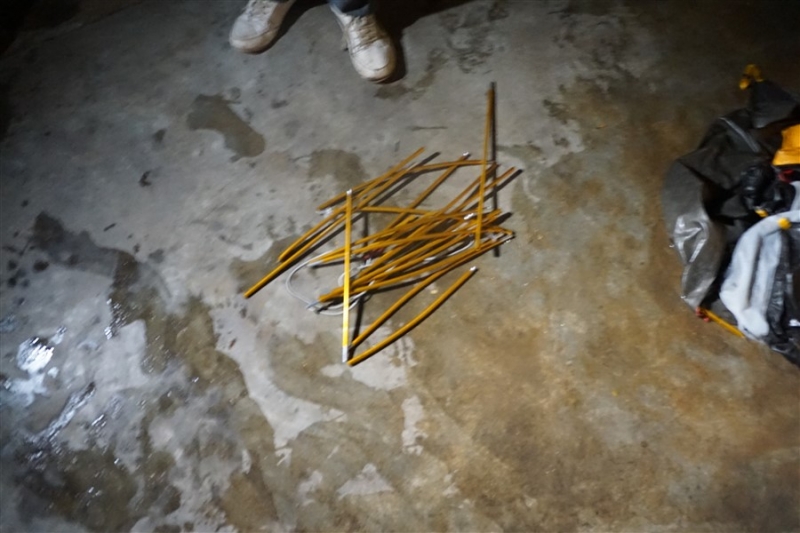
But before that I looked for the missing part in the mud. From 6:20 a.m. till 10:40 a.m. I looked for that part and found at the end. I took out the repair kit from my bag and first repaired the broken part. Then, I put up my tent and repaired the upper tent. The head lamp in the tent was completely soaked in mud, it didn’t work. I laid all the wet cloths in my bags on the tent to dry.

I took my laptop out from its bag. This is no good. The bag was filled with mud. Fortunately, I had transferred all the data on my computer to an external 350 km before. After cleaning my bicycle and the stuff I set off. I recorded and photographed what I had gone through in this place and shared on Facebook. That wasn’t an issue a single man could cope with but it was a part of a sociological study. There was an issue I was curious about, therefore exerted so much effort.
After everything was dried a very bad smell started to rise either from my cloth or from the bicycle. The road was still narrow and in bad condition and didn’t change same till Francistown. There are two hotels in the city centers both cost 127 USD per night. I asked for cheap hotels, checked from Google but didn’t work. I asked people, they all directed me outside the city. I really was still feeling bad and after that night I wasn’t able to sleep and arrived in this town. I needed a warm shower and a good rest. I looked around for hours in the city to find a place to stay. At the end I found a nice place to stay for 30 USD per night, Digger Inn. The room I stayed was really very nice. A South African family was managing this place.

Francistown was among the best towns besides the capitals I have seen for a long time. In a shopping mall in this town I found an outdoors shop “Cape Union”. I wouldn’t think a shop in this region where I could find most of the technical gear I needed. My head lamp was swept away during the flood. I bought a new one in this store.

I strolled around in the town, Ukraine and Moldova came in my mind. There are peddlers everywhere on the streets. Outside the shopping mall you can find peddlers selling fruit and vegetables. There were people selling second hand dresses or repairing dresses with their sewing machines. It is possible to find a Chinese shop in every street, the owners also Chinese. This town was built by the workers of the mines and didn’t lose its popularity till now. It is said that this town will be more populated than the capital Gaborone in close future. Furthermore, it is close to Zimbabwe.
Mehmet working for the Turkish company KS Energy situated 500 km to the east of this city contacted me and said: “Abi (elderly brother in Turkish) I’m in Francistown, let’s meet there.” First we went out for dinner, then went to the bar of the restaurant and chatted. The next day, I had dinner in the same restaurant. Then, while watching the world rugby final on TV at the bar some people came to me to chat.From the hotel management they were informed that I was traveling around the world on bike. Waren, the operating manager of a copper mine in the town Toteng said:
– You are doing a great job. We also have a cycling team.
– How come? A cycling team of a copper mine?
– Yes
– But this is indeed great.
– If you would come to the town and meet our cycling team, it would be a good motivation for the team before the Kalahari Desert race.
– Let’s see where Toteng is? (I opened the Google map)
– Below the town Maun.
– Hahaha at the other corner of the country. Alright Waren I’ll come. Thank you for your invitation.
– Alright, we’ll cover your accommodation and meals, a hot shower inclusive.
– Good : )
One of the most frequently asked questions by the recent followers is: “How do you determine your route?” I don’t have a rigid route, only the countries are defined. After entering the country the route depends on my mood. For example, I had mentioned that I rode above 2000 km within a month only in Botswana.

I rested in Digger Inn Lodge for 2 days. I met with nice people and recovered from this flood issue. Since there was nothing worth for sightseeing in the city I set off. In the mean time I had the opportunity to think about some issues. If there is no one on my side, then there is no need to dream high and burn myself out.
After this flood issue only Elif Uzer sent me such a message: “I have 400 TL on my bank account. I’m sending to you.” She is cycling in South America for years on her own and I definitely know what she has been gone through so far! I hug her with love this brave hearted woman who was talking about her tour in 2011 in Istanbul standing in front of me at the coast. You are the best. Also my family said: “Son is there anything you need? Do you have enough money?” I didn’t accept my family’s and Elif’s offers. But the message was important.
Apart from them, people from the cycling community, heads of associations and clubs, friends, athletes and other people I’m supporting recovery messages came written below the photos I shared related to the flood. Thanks to everybody.
The next week one of the athletes I was supporting asked for new gear. Also, support was asked for a project by the cycling community. I financially supported my athlete. The project my friend from the cycling community was asking, I had given my support previously. For hit requirement I told him about what I had gone through recently and my thoughts. I supported the same way people did me “good luck”. In the message sent after a few minutes: “I got it Gurkan. You are right, shame on us.” For years I haven’t given my all or made effort to show people the purpose and meaning what I was doing. As how I’m not able to understand the experiences of others, I don’t expect others to understand what I have gone through. What I want to say, be at his/her elbow when your close friends fall down.
I attached the last bag on the bicycle. Let’s ride to the biggest diamond mine in the world and I wonder what I’ll see. There is no shoulder on the road between Francistown and Orapa but at much better condition compared to Kasane-Francistown road. As soon as I get off the road the wheels pull all the thorns like a magnet. At one noon I counted the number of thorns on my rear tire while taking them off, 62. The tire didn’t blow out. On this road for the first 10 km there was traffic and after that completely empty. On the road I stopped at a village and asked for permission to overnight there. The villagers took me to a house and told me in broken English that an American woman was staying there. Her neighbor told me that she went somewhere out with her friends. At dinner I learned from her neighbor that she was working for Peace Corps. If not I would get surprised. He also added that in other 4 villages there were people also from Peace Corps. Generally, when I share about these people, what they are doing, how they are living my followers call them as missioner or spy. Those people are none of them. There might be some who would say: “No Gurkan, you don’t know. They are spies.” No need to talk or to explain to such people.

There is a place called Kubu island on the north of the region on the road towards Orapa. Actually it is a salt lake but due to rain it turned into mud. I left the asphalt and came 35 km close to this area but couldn’t get there on my bike. If you would travel in this country I’ll advise to visit this place. I also saw that the villages in this region were supported quite well by the government. The villages were built from the ground.
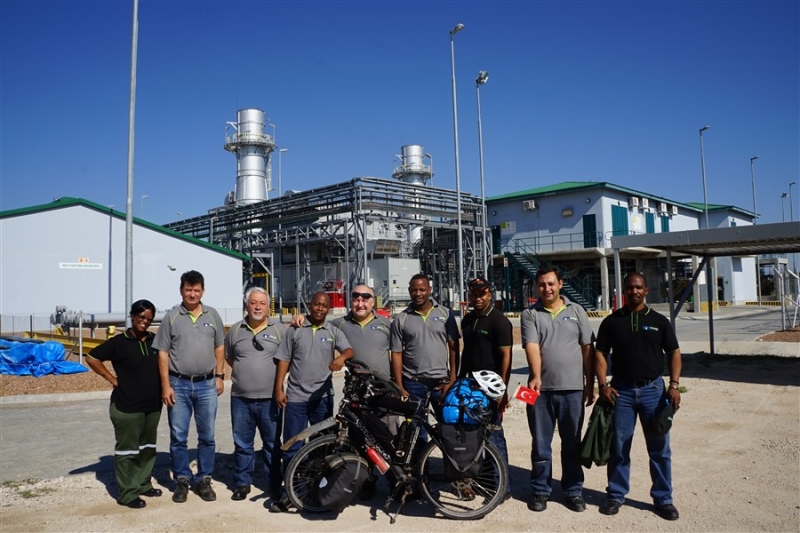
I have already mentioned that the world’s biggest diamond mine is in Oraba. Therefore, unless you know someone from the city you are not allowed to enter. This city was entirely built for the mine workers and their families. The biggest share holder of the mine is the government of Botswana. KS energy built the power plant using diesel as fuel. The reason for such a power plant is that if electricity is shut down the loss of the mine is counted by million USD on daily basis. There should be electricity continuously. There are 4 Turkish engineers working at the power plant. I received the necessary documents to enter the city due to them. I would like to thank once again to Mehmet, Idris, Ahmet and Yusuf abi.
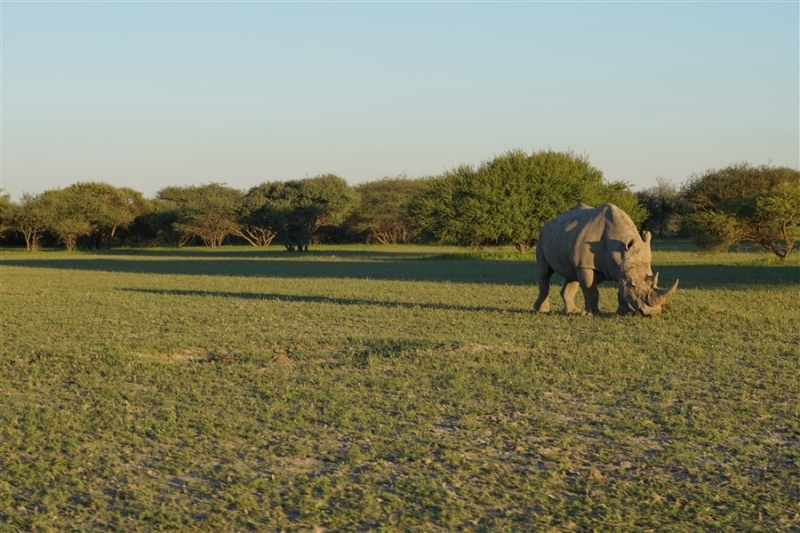
One day we went to the wildlife sanctuary in Orapa together with Yusuf abi. There were 16 rhinos at the reserve. One of them recently delivered a baby. The rhino was standing on the middle of the park with her cub to protect from any danger. It was forbidden to enter that area by car. Armed military forces were protecting those rhinos. Formerly there were also lions in the sanctuary but when they started to pass over the fences and attack farm animals they had to be replaced to another reserve. After the lions were gone the number of gazelles, kudus and other herbivorous animals increased. Upon this increase also shortage of grass became evident and grass had to be imported from other places. If you take out one of the rings of the chain providing the balance of the nature will collapse. The presence of the hunter is a necessity.
The road from Orapa to Maun is dangerous. After Orapa the wire fences also stop. Now I’m an open target to wild animals once again. There are signs on the road warning for leopards and elephants. I have to be careful. Furthermore, lions move freely in this area. Think over again if you want to cross this area on bike. After seeing those signs my speed didn’t drop below 32 km/h. While cycling at such a good pace one of the inner tubes blew out after a long time.
– Fuck. The tube lasted for 10 000 km and look where it blew out. Fuck.
It is like deserted, for hours not a single car has passed. The grass along the road is grown high I cannot see the surrounding area. I guess this would be the fastest inner tube change during my whole trip. I didn’t record the time but really changed quickly the damaged tube and went back to the road. While changing the tube I kept looking around to check whether there was something or not.
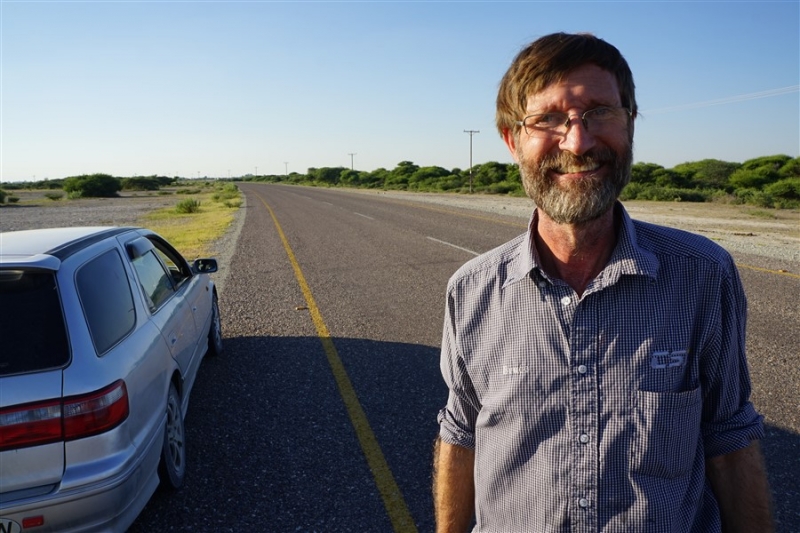
Between Orapa and Maun I stopped over twice. Once, John a missioner invited me to his home. Yes, this time I met a missioner, he directly told me that he is a missioner. Since John had some work to finish he gave me his home address and Aryan from the Netherlands met me.

A former bank worker he quit and worked in different countries for the last four year as a volunteer Farming in Australia, aid works in Kenya, helping to establish drill wells and educational help in Tanzania. He worked waiter, cook, etc. He said: “I’m happy and feel myself free. On top of it I help people.” He was working together with John to prevent desertification in Botswana. He had recently come to this country. It was nice to talk, share experiences, share the same opinion at some points, to talk about what we could change with someone who was traveling through the world this way. I was really a good conversation.
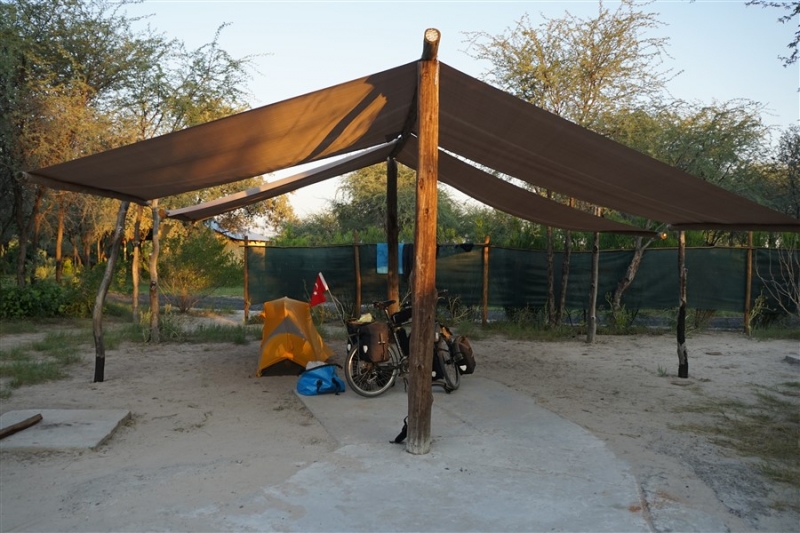
The other stop over Tiaans Camping in Xhumaga was really a beautiful place. If you’ll go to a safari in Botswana, you must stay at this camping site. To me it is the best camping site in Botswana. The park area is pretty good there are places for tents and a pool. The meals were the best I had in Botswana. At the roof there is a nice sitting area. The first night while I was preparing my dinner I observed the elephants washing themselves in the river just in front of the site. The owner of this place had traveled for years this region with her husband and liked Botswana very much.
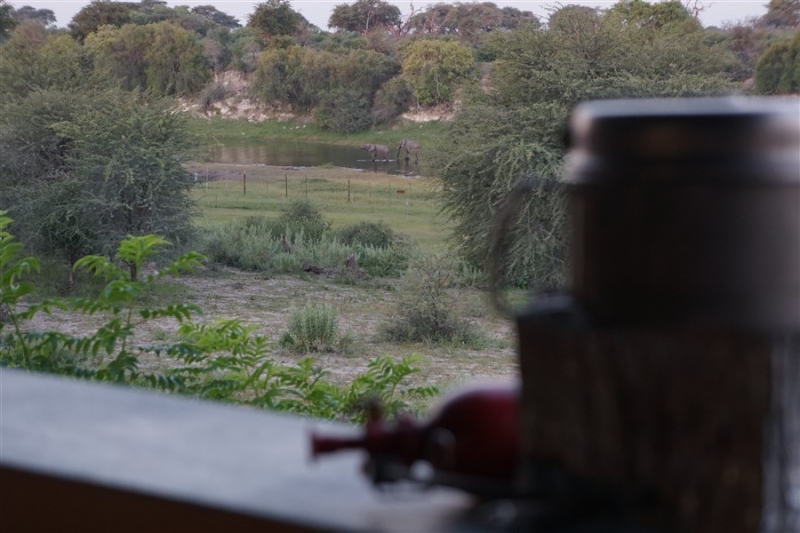

As they decided to establish a German type camping site here her husband got cancer. But they didn’t quit their dreams and worked for 3 years to establish this place and her husband died just before the opening. She said: “I’m continuing to realize our dreams here.” Their son a famous cook in France had prepared the menu. Now, it is clear why the meals were so delicious.
The distance between Maun and Xhumaga was 147 km and since the road was straight forward I arrived in Maun the biggest city in the north in the afternoon already. My countrymen in Orapa had informed Erdogan a Northern Cyprus Turkish Republic citizen about me. He hosted me for 3 days. Erdogan had come 35 years ago to this region and then settled down in Maun.
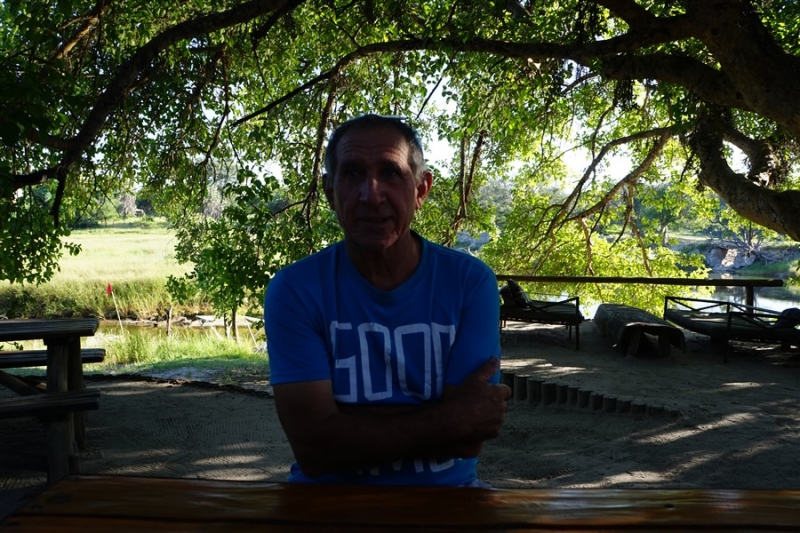
– Erdogan abi, I guess 35 years ago this was a wild region. What the hell were you doing here?
First he came to Zimbabwe. He was working at the railway the British were establishing in this region. During the uprising he went to Botswana and married to a local woman. His life story is amazing. If you find yourself one day in Maun ask for him, local people know him as Edi. Ask people, they would show where you can find him.
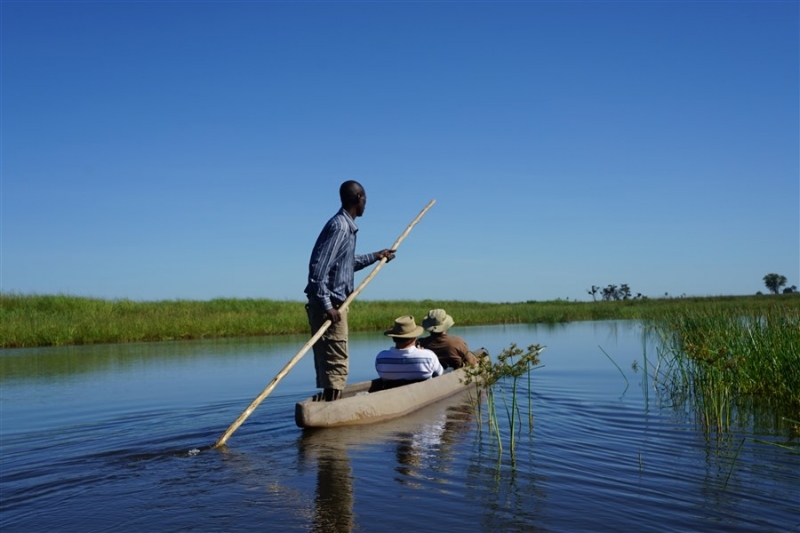
Maun is famous for the Okavango delta. For years I have been watching on documentaries and now I’m riding on bike in this area. It is hard to ride on bike to the mouth of the delta from Maun because of sandy road. Even, 4×4 vehicles sank in sand. There are two possibilities to visit the Delta: Day trip or multi-days trip with camping in the middle of the Delta. The camping trip wasn’t attractive to me. People tried to sell this trip saying star watching at night in a wildlife reserve, sleeping at the Delta, etc. It didn’t sound attractive.
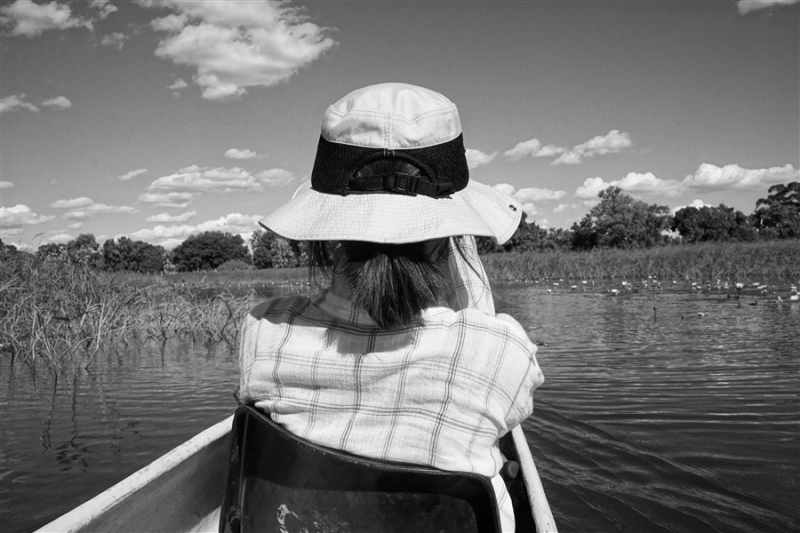
I was caught by a flood in the eastern part of the country. But in the western part of the country water level of the Delta was at its lowest level due to lack of rain. We visited Okavango Delta with my friend Kim from South Korea. We had a nice conversation in the car while heading towards the Delta.
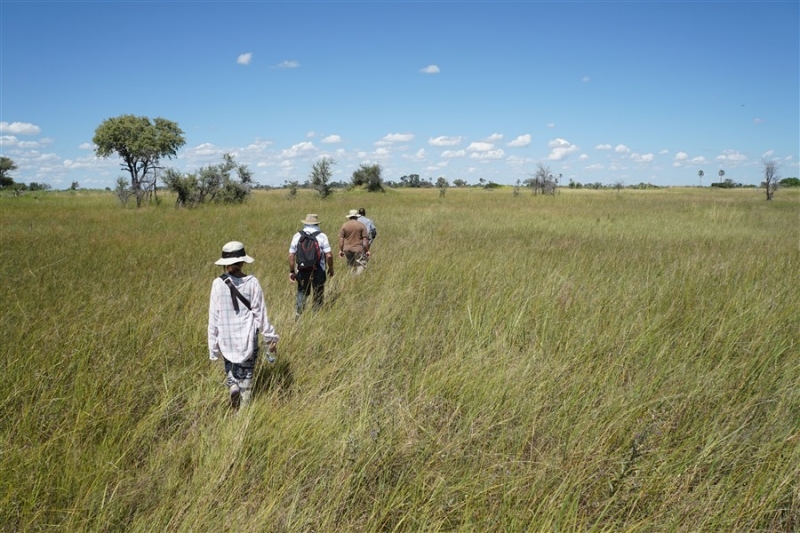
She has come here to work as volunteer in regional aid projects. She worked for the last two years in Mozambique, Zambia and Botswana for meals and accommodation only. She has witnessed on her own what was happening in this region. She was planning to work for other projects in this region for a couple years before returning to her country.
In addition to this conversation:
More than 80% of Israelis and 90% of South Koreans and Japanese travel. The table below was prepared by TURSAB (Association of Turkish Travel Agencies) in 2015.

This was the period when I was traveling in Europe with a budget of 3.5 Euros per day. There are countries in Africa where I didn’t spent money for 3 months or only 50 USD per month. There are countries in the Middle East where I didn’t spend any money for 5 months. I’m not the only traveler who is traveling like this. A passport is said to be expensive. Turkish passport has 60 pages, the ones of other nations only 30 pages. In this way Turkish passport is not the most expensive one but also not cheapest. If I would have the authorization I would cut the price of the passport to half and reduce the number of pages to 27. But, the present situation is an advantage to a world traveler like me (Let me add this information also. I received my passport in Golbasi/Ankara on May 2012 paying its fee. It is not a diplomatic or special passport but an ordinary passport. I’m paying all the visa fees from my own budget. Some of my followers think that our Foreign Affairs Ministry is taking over the costs for my passport and visas. I wish it would be the case, but isn’t. : ) According to the above table while Turkey with 85 million population has so low traveling rates; the knowledge about world politics and economics, country’s dynamics is quite deep and the writers publish new books reviewing other books. There are too many specialists. What happens to UK after brexit, why UAE citizens can enter EU countries without visa, many other questions are answered “brilliantly” as if 90 % of the country’s citizens have traveled and have done field work.
This is up to your own interest, if you don’t want you don’t travel or don’t read. I also want to add one thing based upon my observations: As how often a country’s citizens travel and read, they’ll be able to produce Sony, Samsung, LG, Honda, Mazda, Panasonic etc. The software of those will also be developed by such people. They send people to the universe, establish observatories and discover Qatar 1, 2, 3, 4, 5 planets (the young people working there travel by means of their country’s richness but travel. You have read above how the Korean traveler was traveling). You create the most magnificent city of 21st century in the middle of the desert.
The people of nations not traveling and not reading have only low or no impact on the development of the mankind. They struggle within themselves. To the famous question “Who knows more, the one traveling or the one reading?” my answers is “the one reading while traveling”. Look others are sending satellites to Jupiter.
Since I was writing this article during Ramadan, people where curious about the answer of this question: “Do you fast during your travel?” If a Muslim is asking such a question I would say he doesn’t know about his religion. God said: “Read”. But he hadn’t read since he was asking me. The second most frequently asked question in the Muslim world is: “Are you Muslim?” which I had mentioned about in one of my previous articles. Look, people who are following me know that I’m a faithful person and don’t disrespect others beliefs. I pray and continue on my way. But who the hell are you and find the right to ask other people whether they fast, they pray. What kind of people are you? In my eyes people questioning others beliefs are ignorant persons. Look what people are researching while some other communities question the beliefs of the others. Don’t ask anyone and me not at all!
Look what NASA is doing for the future of the mankind. Life will continue, therefore one should not consider only the eternal life. We all have to think, learn, research and all work together for a better world. Follow those institutions my friends.
As I promised in Francistown I met with Waren and the cycling team of the mine before the Kalahari Desert Race in Toteng.
While cycling down from the west of the country I passed a control post after Toteng and entered the region of San People also known as Bushman. Just at this gate I chatted with Greg and Ann filling gasoline in their 4×4. They invited me to the hotel they were managing. I said of course I’ll visit you.
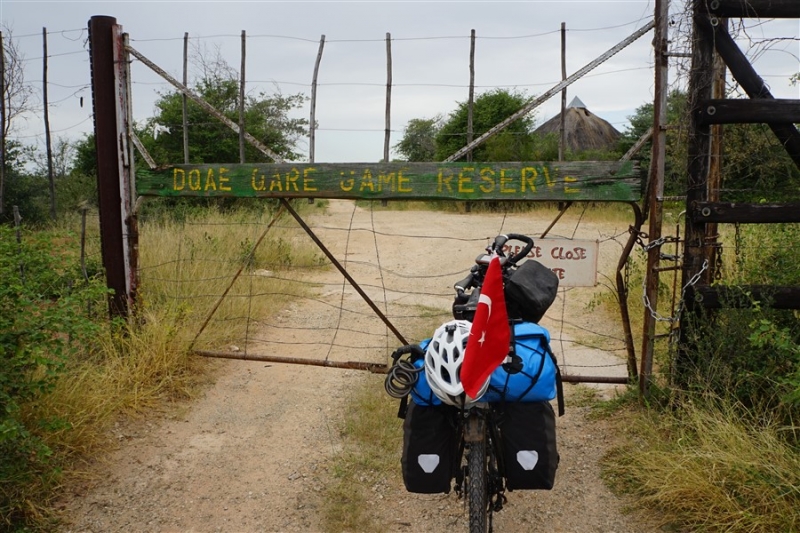
After two days I came to the fork and called Ann whether I was at the right place. Yes. I came off the road and rode about 3 km on dirt road. Then I came to a big gate with Game Reserve sign. On this land safaris were done.
– Hello Ann. I’m at the Game Reserve gate but I’m not sure that this is the right place. Is your hotel inside this area?
– Yes, Gurkan. Just push the gate and enter. Don’t forget to close the gate back again. It is 7 km ahead.
– You know that I’m on bike. I have never attended a Game Reserve on bike before.
I had passed through national parks with wild animals inside before but there were also vehicle traffic. In this area I’ll be on my own. Therefore I’m hesitating.
– Don’t worry Gurkan. We walk inside. For a long time animals have not been seen around that entrance gate.
– Animals? (There are all kinds of wild animals in the Kalahari Game Reserve)
– If you want we pick you up.
– Are you really walking around inside?
– Yes, Yes. Every morning we have a walk.
– Alright then. I’m coming. See you.
One of the craziest things I have done in my life was this Game Reserve where I pushed the gate and entered in. I looked at the road I have to ride on. Even, in car you would get excited.
Since the road was in bad condition and I was riding fast the thermos bottle hit the cage on the frame, the noise frightened the animals, impalas and kudus started to run away. Also a group of warthogs started to run away, hearing the noise. The feeling on this road was pure adrenaline. Once and more the bicycle stuck in sand and I had to push it. At the end I reached the place 7 km inside the Reserve without being abused or charged by any animals.
Ann met me at the door and hugged me.
– My God! It was an incredible breathtaking experience Ann!!
– Hahaha. Welcome Gurkan. On this side there are mostly impalas, kudus and giraffes. The lions and cheetahs are found mostly further in the desert. The vegetation at this site is too dense to hunt for them.
– But I guess there are leopards here in this region Ann.
– They are everywhere. You have to take care of trees Gurkan. Haha. Welcome again Gurkan. You can stay here as long as you want. You may set off whenever you feel ready. This is your house.
I didn’t know what to say. I hugged her once again. I wish I would have more time but my visa was expiring, I could stay only two nights.
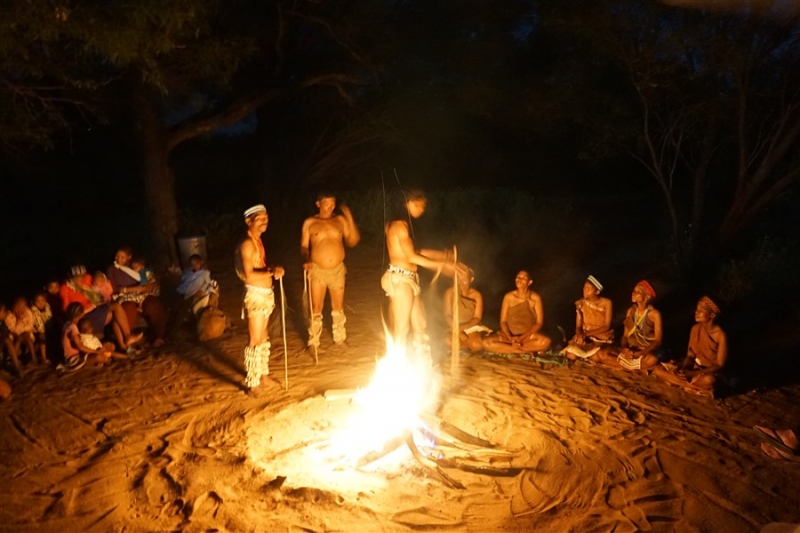
Why did I want to stay longer at this place? This is the territory of San people or Bushman. Dekar and Ghanzi are their larger towns. They are completely different than the other Africans. Their noses are like that of Vietnamese and Malaysians, their eyes are like that of people in Asians steppes. To go to Dekar you have to leave the main road. Formerly they used to occupy a much broader land in Botswana, but then they were relocated to the border of Kalahari Desert on the west of the country by the government. Initially San people were given domesticated animals in order to earn their own money. Also, farming equipments were given to cultivate their land. But those people were foragers. Bushmen cut and ate the animals given and sold the equipments to buy alcohol. The reason why they were relocated to this area was because rich underground sources were found in their former territory. Also, a charcoal reserve was found in Kalahari region. Now, the government wants to relocate both the people and animals living there. Of course many national and international institutions are campaigning against this.
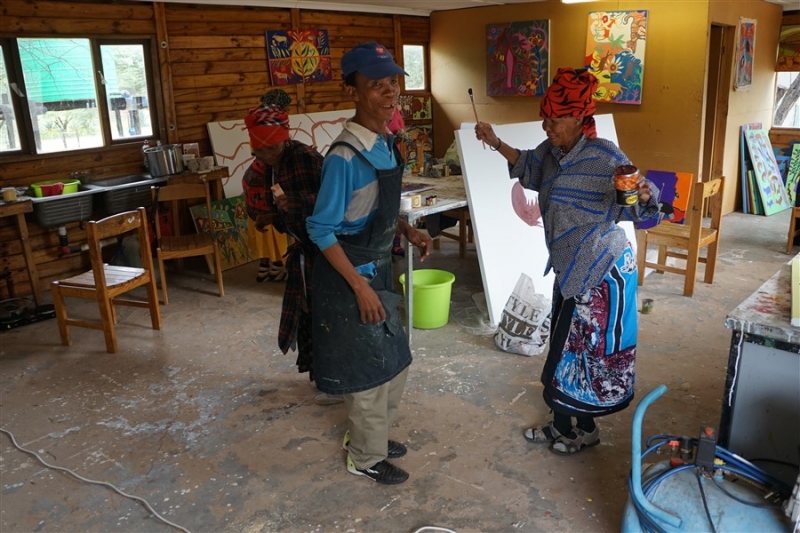
I went to the village Dekar on bike. People were poor but nobody asked for money, the children included. Dekar has a quite big school. I poured the water in my thermos bottle on the ground and went to the school for fresh water. The attendants at the school gate showed me where I could get water. Compared to the other schools I have seen in Africa this one is in a pretty good condition. One of the teachers showed me where I can fill my bottle. In the school I asked whether there were people from Peace Corp. They said yes and showed me the class room. A young woman was teaching English to the local people. I didn’t want to bother and went out to stroll around in the village. They had built an art house where handcrafts were sold. I stepped in and took my camera out immediately with a big smile on my face. Elderly people were dancing and painting. I really like when they talk with this click sound. I tried to speak my own language and English with this clicking sound but couldn’t. This sound hears nice and I immediately start to smile. They were selling their paintings to a tourism company in Botswana. The rest were sold to the tourists coming to the region. I told them that I cannot by a painting then they showed me necklaces they made from ostrich egg shells. I liked them and bought two of them: One for me and the other for my mom. I handed the money to one of them. He immediately divided into the number of the people present and distributed the money. At evening I asked this to Ann. She told me that Bushmen whenever they earn some money were distributing among all the family members equally.
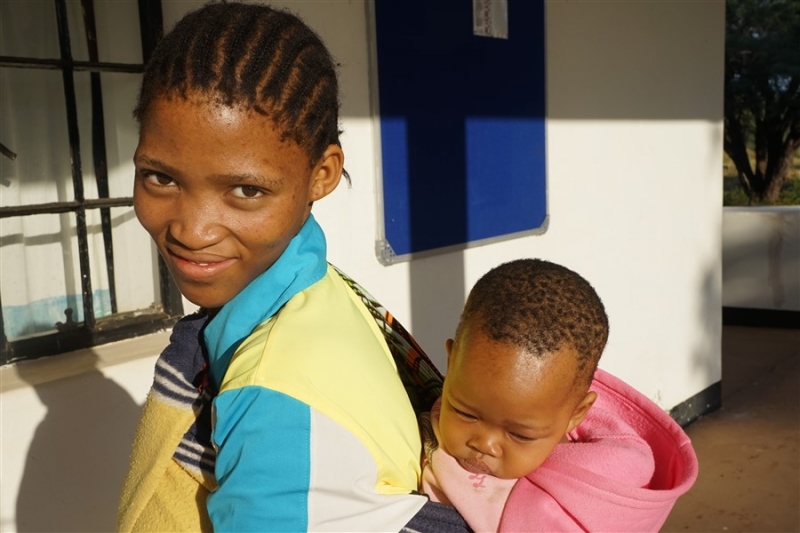
The place where Greg and Ann invited and let me to stay in was a building used for research and regional observation reflecting British architecture of late 19th century. As the government relocated the San people to this land the building was assigned to them. The tribes living in this area tried to adopt themselves to today’s conditions. They had tried to manage this place as a hotel but couldn’t. Then, they asked for help from white man and offered to share the profit. But this also didn’t work. Lastly, the couple Ann and Greg who had been living for many years in Africa came: “Let us produce together and share with each other.” Then after all became better and this spot became one of the most beautiful recreational areas of Botswana. There is no electricity they make use of solar energy. They have water usage hours. There isn’t a fixed menu they offer for meals. You eat what is cooked. Sometimes you have casual meals sometimes meals made of strange plants. There aren’t any fixed employees, every month 15 people from the tribe work here and then other come. On the second day two persons from Tourism Ministry came to this place on their duty checking the accommodation facilities. I had come across their car a day before:
– Hey! We had seen you yesterday on the road and couldn’t believe our eyes. Where have you come from to this place?
– From Turkey.
They stared at me astonished.
– All the way from Turkey on bike?
– I only took ferries to cross the seas, took a flight from Oman to Ethiopia and then from Ethiopia down here on bike.
– Where have you been in Botswana?
Telling them where I have been so far, they asked me: “Why didn’t you get in contact with our tourism Ministry?” Let me give additional information to the ones who plan to come here: If you think you will contribute in promotion issues of a country, contact the country’s tourism or cultural ministries. You’ll be covered for accommodation and transportation expenses. Also foreign travelers are receiving such supports from our institutions. They come to the country take photos, have their vocation and back at their home they tell about the country they have visited to their own people. Since I have almost no accommodation and transportation expenses this does not fit me. Anyway, I received some supports from different countries now and then.
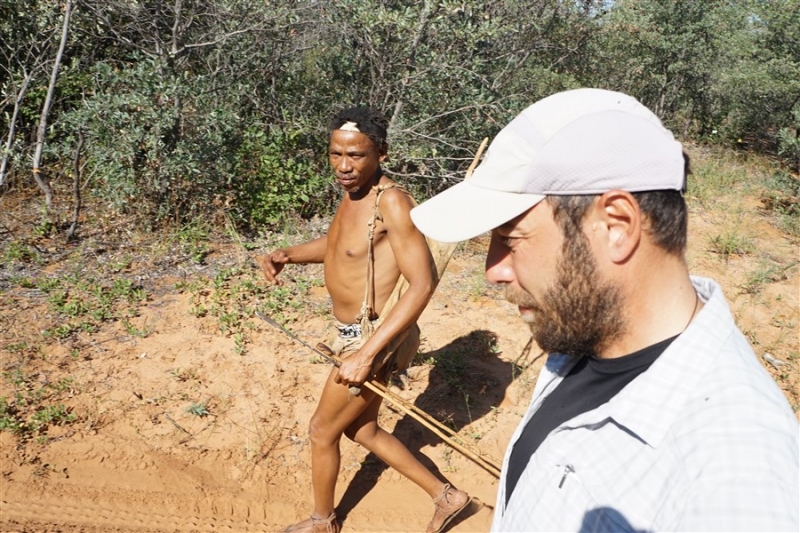
One morning set off with Karabo to trace and to find out in which direction the animals have gone. He showed me the footprints of giraffes. I said: “I guess there are 3 giraffes.” “No, there are 7 of them. And one of them is a calf.” “How come? How could you recognize that one of them is a calf from those footprints? I give up!” He shows me. He can also differentiate whether someone from the neighbor village has passed through this area. Even, he can recognize whether a woman is carrying her baby on her back from her footprints. He told me when the giraffes had passed. We came to dung of the impalas. He said: “They are not around. This dung is two days old.” We didn’t have a TV in our student’s house. As a graduate of Communication Faculty I always was bad in TV issue. I was spending my spare time reading a book or playing on computer. Our biggest fun was Fantasy Role Playing (FRP) games. This is a marvelous game when played with people reading a lot and having extensive imagination. I played this game of many years with lots of people in Ankara. Anyway, in this game was a character known as “nature’s warrior”, a ranger. One of the biggest abilities of this ranger was tracing. With dices you determine his ability to trace right or wrong. Well, this man is the real of this ranger. Even if he would dice only 1 out of 20 he would trace the right one. Aside of this, till noon time I ate about 40 different plants or roots.
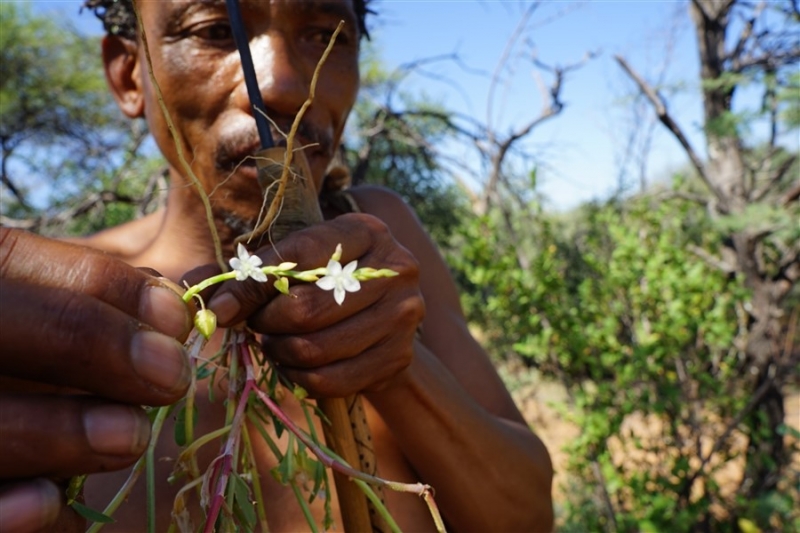
Some of the plants were so delicious to my surprise. He thought me how they make musical instruments from butterfly cocoon. He wanted to introduce a plant I said: “I know this. You eat it raw when bitten by a scorpion.” He got surprised. Well, I traversed deserts of course I researched and asked people what to do. Though I was looking around walking among bushes I didn’t recognize even once the spider webs.
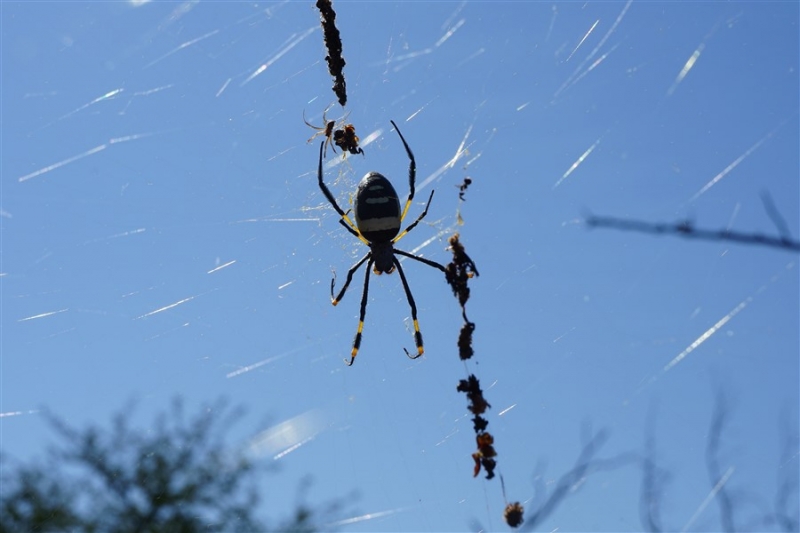
“Watch your right, watch your left, there is a spider web.” He thought me how to approach the holes dug by warthogs and how to understand how many days before they were dug. The animals to be hunted had been a couple of days ahead He decided to take a 4×4 vehicle tomorrow to get there. By the way, they are still using arrows and spears for hunting. The government put some limitations for hunting. Karabo is against these limitations:
– Gurkan, the number of herbivorous animals is increasing day by day. They seriously harm the nature. Furthermore, the number of lions decreased drastically. If we don’t hunt them how the balance of the nature are to be protected?
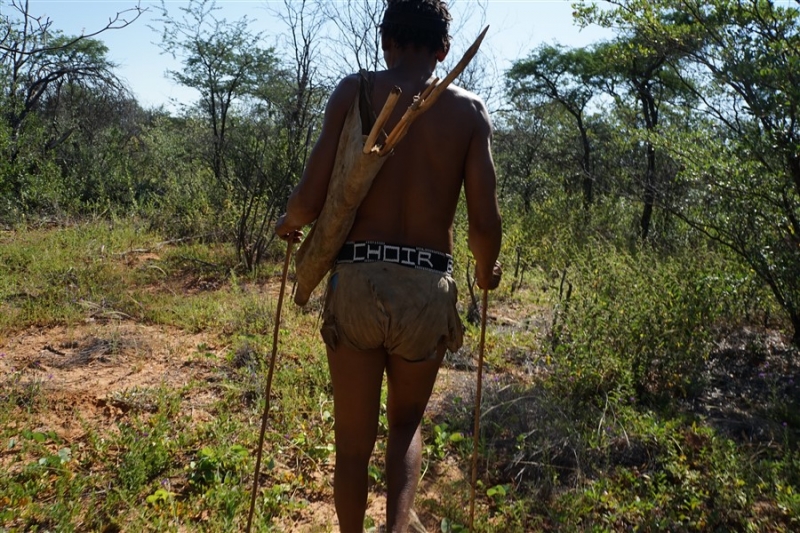
The government ordered the San people to get hunting license. Dude, how come a man barely dressed walking on land could get a license? The national reserves in Botswana are either protected by soldiers or rangers. They are provided with such authorization: “To shoot anyone with a weapon within the national reserve.” While I was three hunters from Namibia were shot and killed. It’s no joke. Do not carry a weapon within a national reserve. Karabo, before hunting, went to Ghanzi 40 km ahead to the Directorate of Wild Life Preservation for a hunting license. While hunting in the reserve the officers ask him for his license. These people are hunting under need. In this way, I have witnessed how the animals destroy the nature when such hunting does not take place.
After I thanked Ann and Greg, I left. We may have a small partnership in the future, why not. This was one of the places I liked very much in Botswana.
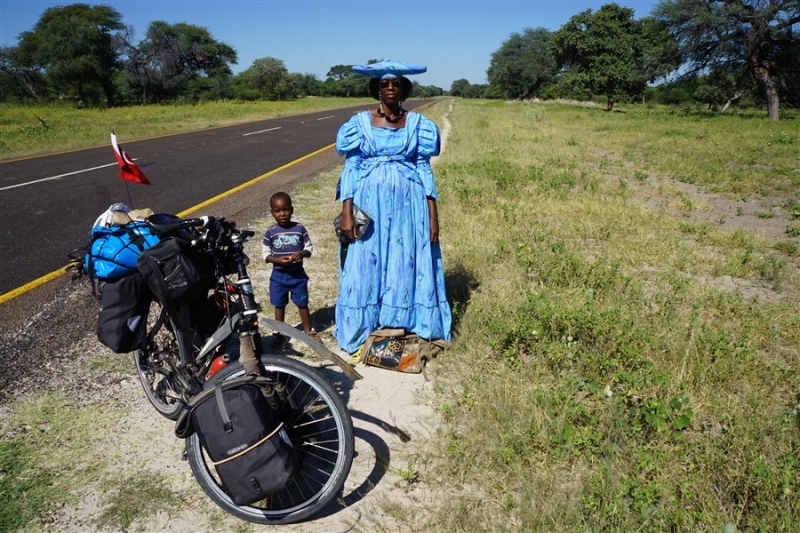
After Ghanzi till Kang there is nothing for 320 km. Then, there is a fork to Namibia. You may think: “Dude, a fork. There should be at least a gas station or a restaurant or so.” But nothing! This is a very boring 320 km long straight forward road. I had to camp one night on the field riding 160 km per day for two days. Adrenaline was at peak. One day I saw hyenas along the road and laughed at my reaction. They looked at me for a while from a distance and when I came closer to photograph them they ran away and hid behind bushes. Those animals were afraid of me and ran away while I was so excited to take my camera immediately out. The next days I cycled more than 120 km in 5 days and arrived in Gaborone. There I was told that a man on the way to his village was killed by a buffalo herd. I arrived in Gaborone one day before my visa expired. One of the places I stayed in Gaborone was the backyard of a police station. You usually are allowed to put your tent up at police stations.

Hande living in UK sent me a message: “Gurkan my cousin Oktay is working there. You can stay at his house.” I have never met with Hande before. She started to follow me since I entered Botswana. If I would have stayed longer in the country we could have met since she was planning to visit her cousin and travel in Botswana. Oktay works of a Turkish company. Let me tell you how many Turks in this country live: 4 in Orapa, 1 in Maun, 7 in Gaborone who’ll return to Turkey when the work is finished, 4 in the embassy. I’m not kidding. There are really no Turks in this country. One of the reasons is the low population, 2.6 million people is living in the country. Oktay and Murat hosted me very well. I would like to thank them once again. On the second day I arrived in the city I went to the Ministry of Interior and prolonged my visa with no difficulties.
I hadn’t been in a capital city in Africa where I could find many things for a long time. From electronics to camping gear I found everything I was looking for in this city. Also, there is an active social life. I watched a 3D movie. It is relaxed in the evenings to walk around, a safe country where I could go out on my own. It is almost impossible to go out on your own at night in other African countries. Botswana is the most democratic countries in Africa which is among the top 10 in the world. Turkey is only 21st in this list. I feel this difference from the behavior and attitude of the people while among them. They hug you as if you were their best friend. The general problem in this country is in construction sector. Both Waren and also Turks told the same, it was difficult to find good working employees among the local. Actually, the working discipline of black people are criticized everywhere from Ethiopia to this point. Either they don’t want to learn how to do or do the way they know. However, in many countries Zimbabwean employees were praised for their sedulity. This has nothing to do with the skin color but depends on the society in which people have grown up. I want to add to this also manners and customs of the societies they belong to.

Thanks to our embassy I was able to give interviews on TV channels and also had the opportunity to meet the head of Bicycle Federation. Our ambassador also met him for the first time. The president of the Bicycle Federation was the son of the state president. Furthermore, he was one of the top authorized persons in the Water Management Ministry of the country. On this opportunity, our ambassador mentioned about the water and irrigation projects Turkey was undertaking in other countries, meanwhile I also talked about water channel projects Turkish companies were undertaking which I came across during my travel. He told about a project transporting water through pipes from Namibia. By the way, he is the son of the state president it can be saidhis employment it is a matter of priority. I attended a training of the national team of Botswana on weekend. We rode for 60 km with a speed of 27 km/h on the average together. That is, I’m 55 years old and therefore cannot ride on bike is not an excuse. : ) We exchanged our phone numbers for joint projects in the future.
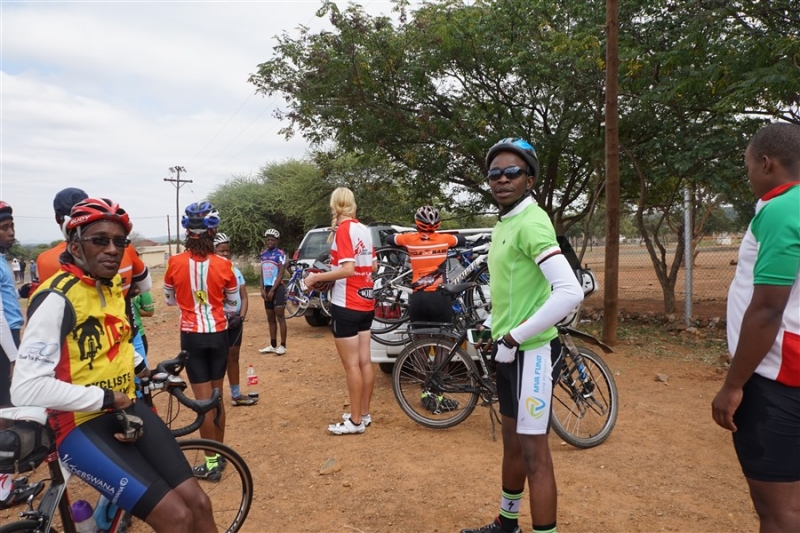
The president of the Turkish Bicycle Federation has not sent a message yet though 6 years has been past. He remained insensitive to what I have been undertaking and to future project collaborations though have had sent him messages. If you Turkish citizens allow me to realize in the future, I have very good ideas for our athletes.
The day I set off I hadn’t decided which border gate I would use. There were three border gates to South Africa. I chose the gate near Mahikeng the farthest town. I guessed only a few people were using this border gate and the procedure would be completed in shortest time. I continue to travel in South Africa.